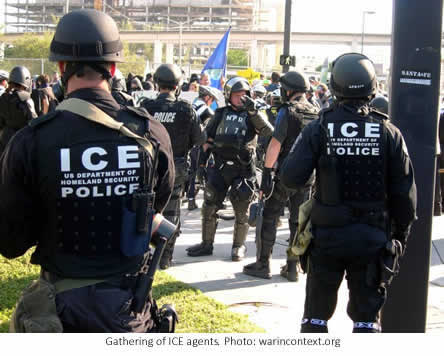|

 he
affectionate Filipino term for a deportable alien in the U.S. is “TNT”,
short for “Tago ng Tago” or always hiding. It also stands for
“Takot na Takot” or very afraid. These two translations of the acronyms
accurately describe their ever fearful state since President Trump’s
Immigration and Customs Enforcement (ICE) agents began rounding up TNTs
from countries all over the world in the last two weeks. he
affectionate Filipino term for a deportable alien in the U.S. is “TNT”,
short for “Tago ng Tago” or always hiding. It also stands for
“Takot na Takot” or very afraid. These two translations of the acronyms
accurately describe their ever fearful state since President Trump’s
Immigration and Customs Enforcement (ICE) agents began rounding up TNTs
from countries all over the world in the last two weeks.
The February 13, 2017
New York Times headline “Undocumented Immigrants Rounded Up” would not
technically describe Filipino TNTs because, unlike their Mexican
counterparts who crossed over the land border from their homeland by
foot, Filipinos entered through airports with passport documents so they
are not "undocumented".
But the term is
preferable to “illegal aliens” because, as Nobel Peace Prize winner and
Holocaust survivor Elie Wiesel said, “no human being is illegal”. Also,
in a 2012 immigration decision of the U.S. Supreme Court, Justice
Anthony M. Kennedy noted in the majority opinion, “As a general rule, it
is not a crime for a removable alien to remain present in the United
States.” It is a civil offense.
Despite the 2012
ruling of the US Supreme Court, in his Tweet on February 12, 2017, Trump
insisted: “The crackdown on illegal criminals is merely the keeping of
my campaign promise.” [But what about legal criminals?]
"ILLEGAL CRIMINALS"
In his January 25,
2017 Executive Order about building the Mexico border wall,
Trump included a provision vastly expanding the definition of who is
considered a “criminal”.
A “criminal”, under
Mr. Trump’s new order, is anyone who has been charged with a criminal
offense, even if it has not led to a conviction. It also includes anyone
who has “committed acts that constitute a chargeable criminal offense,”
which means anyone authorities believe has broken any type of law —
regardless of whether that person has been charged with a crime.
This order
also encompasses anyone who has engaged in “fraud or willful
misrepresentation in connection with any official matter or application
before a governmental agency,” a category that includes anyone who has
ever used a false Social Security number to obtain a job, a common
practice of unauthorized immigrants.
Just hours after Trump
signed his executive order, Guadalupe Garcia de Rayos, a 35-year old
Mexican mother of two US citizens who has lived in the US since she was
14, went to the Immigration and Customs Enforcement (ICE) local office
in Arizona for her annual routine check-in, her eighth visit to ICE
since her 2008 arrest and conviction for using a fake Social Security
number.
In all her previous
annual check-ins, Guadalupe would be released and would return back to
her family. Not this time. After Trump’s order went into effect,
Guadalupe was detained and deported back to her native Mexico within 24
hours.
In an interview in
Nogales, Mexico, Guadalupe told reporters that she feared what might
happen if she went to ICE. An immigrants’ rights group told her she
could skip the check-in and go into hiding or seek refuge at a sanctuary
church in North Phoenix.
Before her fateful
appointment with ICE, Guadalupe and her family attended Mass. She said
she clasped her hands and bowed her head in prayer and asked God to
protect her.
[It would be curious
to be a fly in the sky when Guadalupe meets her Maker and expresses her
disappointment that God didn’t protect her when she needed Him. God
would reply that He sent an immigrants’ rights group to warn her not to
go to her ICE appointment and to seek sanctuary in a church instead but
she ignored them. What can God do?]
HOW MANY TNTs?
The total estimate of “deportable aliens” living in the US is anywhere
from a low of 11 million to the high estimate of 30 million given by
right-wing Trump supporter Ann Coulter in her book.
"The number we keep
hearing is 11 million, 11 million, 11 million. That’s so weird. It’s
been 11 million for a decade. But as I explain in the book, they are all
using the Census figures. If the Census figures are wrong, then
everybody’s numbers are wrong," Coulter said in an interview with
Univision’s Jorge Ramos.
 The
estimate of Filipino TNTs in the US also varies from the low official
estimate of 271,000 offered by Philippine Secretary of Labor Silvestre
Bello to a high of 1 million given by Bernadette Ellorin, chair of Bayan
USA. The
estimate of Filipino TNTs in the US also varies from the low official
estimate of 271,000 offered by Philippine Secretary of Labor Silvestre
Bello to a high of 1 million given by Bernadette Ellorin, chair of Bayan
USA.
“One out of every four
Filipinos in the US is undocumented. That’s approximately 1 million TNTs
living in the shadows and in fear of a repressive Trump administration
that has called Filipinos ‘animals’ and from a ‘terrorist’ nation,”
Ellorin said.
Special envoy to the
U.S. Jose Manuel "Babe" Romualdez told CNN Philippines recently that the
US Department of Homeland Security (DHS) identified “310,000 Filipinos
up for deportation” but, he said, the number could be higher. An
estimated four million Filipinos are living in the U.S. Romualdez said
that of this number, 800,000 could be “illegals”.
Romualdez advised the
TNTs to return to the Philippines before they are deported, advice
contrary to what the Mexican government plans to do to assist its
nationals in the United States.
THE EXAMPLE OF MEXICO
Immediately after
Trump’s election, Mexico’s Foreign Minister Claudia Ruiz Massieu vowed
to draw up "plans of consular protection and assistance" for the
millions of her countrymen facing imminent removal from the US under a
president who has called them “murderers and rapists”.
Massieu spoke directly
to Mexicans living in the United States through a video feed on Twitter.
“Countrymen, these are moments of uncertainty,” she said. “Be calm, do
not fall for provocations, and don’t let yourself be fooled.”
She explained that the
Mexican government plans to strengthen its ties with officials at the
state and local level who can ensure local regulations are in place to
protect Mexican communities there. Mexico also plans to strengthen ties
with nongovernmental civic organizations that support the Mexican
community.
Mexico will also
expand its consular services like providing government IDs to
undocumented immigrants, helping immigrants find their birth
certificates, and providing general legal assistance. It will launch a
new toll-free number and roll out an app for Mexicans to use if they
need any kind of assistance.
In contrast to
Mexico’s posture, Philippine President Rodrigo Duterte announced that
undocumented Filipinos facing deportation from America due to US
President Donald Trump’s crackdown on illegal immigrants and refugees
cannot expect help from the Duterte administration.
“To Filipinos there
(in the United States), you better be on the right track. If you are not
allowed to stay there where you are staying, get out because if you are
caught and deported, I will not lift a finger. You know that it is a
violation of the law,” Duterte said.
Duterte said he would
respect Trump’s executive action because Trump had assured him that he
too would respect Duterte’s brutal war on drugs in the Philippines. Quid
pro quo.
“If he has policies to
protect his country, I will understand … So out of respect, I will not
interfere,” Mr. Duterte said.
The TNTs remit
billions of dollars to their families in the Philippines even as they
live in hovels and are regularly subject to abuse by employers who take
advantage of their “illegal” status by paying them low wages and long
hours.
With Duterte as
president, Filipino TNTs cannot expect their government to “lift a
finger” to help them except a middle finger to tell them they’re on
their own.
They will have to rely
on their families and friends and on the network of non-governmental
organizations (NGOs) in the Filipino American community.
A UNITED FIL-AM COMMUNITY
Two days after Trump
issued his anti-immigrant executive orders, the Filipino community in
Jersey City, New Jersey held a town hall meeting at the Philippine
Community Center to discuss the orders’ impact on them.
Atty. Cristina Godinez
of the Migrant Center at the Church of St. Francis of Assisi said: “The
two EOs are just the beginning. They are un-American not just because
they go against the proud history of the US as a nation of immigrants.
These EOs pose a national security risk because they drive the
undocumented deeper into the shadows. Non-citizens who had or will have
any encounter with law enforcement–no matter how minor–are at risk,”
warned Godinez.
“The EOs’ language is
so broad that this Trump dragnet will potentially capture TNTs, those
who are here as tourists, students or temporary workers, and even green
card holders most of whom are peaceful, productive members of our
communities,” added Godinez.
The National
Federation of Filipino American Associations (NaFFAA), with 12 regional
chapters throughout the US (naffaa.org), held a Board Summit of its
national Board of Governors in Houston, Texas on January 27-28, 2017 to
address this issue among many other pressing matters.
Speaking for a united
Board, NaFFAA National Chair Brendan Flores said, “We are closely
monitoring President Trump’s recent executive orders, which has the
potential to affect many lives of Filipino-Americans, including refugees
and immigrant families across the nation. The United States has always
been a nation of immigrants, and a beacon of democracy. NaFFAA is
committed to work with other Filipino American leaders and advocacy
groups to uphold our country’s cherished values during these
transitional times.”
NaFFAA will initiate
advocacy and awareness campaigns, convene planning calls, and compile
resources to help Filipino families who have been impacted.
NaFFAA Executive
Director Jason Tengco added: “We cannot overlook the fact that during
his campaign, then-candidate Trump suggested banning immigration from
certain countries, including the Philippines. NaFFAA wants to serve as a
forum for Filipino Americans to work together to ensure that community
members are aware and engaged moving forward.”
One positive outcome
of Trump’s anti-immigrant putsch is that groups from all political
stripes in the Fil-Am community are coming together to unite on this
issue. The National Alliance for Filipino Concerns (NAFCON) and Migrante
SOMA held a town hall meeting at the Bayanihan Community Center in San
Francisco to discuss the dire situation of TNTs who, they said, “live in
a perpetual state of fear and uncertainty.”
“They shouldn’t live
in fear,” said Terrence Valen, director of Filipino Community Center and
president of NAFCON. “They should be prepared, and assert their rights
together with community groups and organizations. Lawyers are ready and
willing to help them.”
Princess R. Bustos, a
community organizer for Migrante SoMa added: “We are our only defense,
and the only way that we can fight against these attacks against our
community is to stand together, fight for our rights, and protect each
other,” she said. “We will not let Trump’s divisive tactics of pitting
groups against each stray us from holding him accountable.”
Though Duterte and his
government will not lift a finger to help Filipino TNTs in the US, the
Filipino American community promises to use all the fingers in all their
hands to band them al together to protect and support our TNTs.
TNT should also now
stand for "Tulong ng Tulong". Always helping. Published 2/27/2017
(Send
comments to
Rodel50@gmail.com or mail them to the Law Offices of Rodel Rodis at
2429 Ocean Avenue, San Francisco, CA 94127 or call 415.334.7800). |